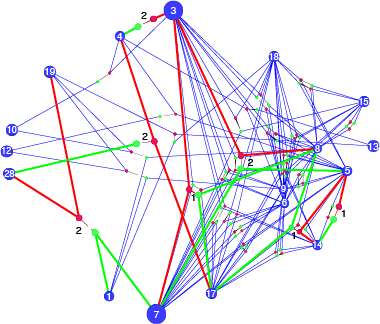The EON Workshop on Computational chemistry: from components to systems and back
EON will hold an international workshop at ELSI on October 10-13, 2017.
Organizer: Daniel Merkle, Eric Smith, Jakob Andersen
Co-Organizer: Earth-Life Science Institute, Tokyo Institute of Technology
Venue: ELSI Hall in ELSI-1 bldg., Tokyo Institute of Technology, Tokyo, Japan. October 10 : registration starts at 9:00am, session starts at 9:30am
Title: Computational chemistry: from components to systems and back

Abstract:
Computational and formal methods for modeling and analysis of chemicals and chemical reaction systems have made enormous progress especially within the past decade. Structure-generating algorithms now enable the systematic enumeration of molecule forms from atomic-level constraints, while process-modeling methods based on graph grammars permit the recursive elaboration of reaction systems from elementary mechanisms. Automated and machine-learning methods are successfully being applied to the characterization of reactions, the discovery of pathways, and more sophisticated application of existing methods such as Density Functional Theory. Expansions in databases both for reaction mechanisms and for thermodynamic parameters increase the power of automated modeling to characterize particular systems in quantitative detail, and to link topological characteristics to directionality and kinetics of reactions.
In parallel with these advances in practical application, the discipline required by formalization clarifies chemical concepts that are inherently complex and often used flexibly in practice, such as notions of pathway and auto- or cross-catalysis. More abstractly, a group of fundamental theorems are known, which relate the topology of the hypergraphs describing chemical reaction systems to the ranges of both deterministic and stochastic dynamics possible on those systems.
These advances promise to qualitatively change the ways we study systems chemistry and pose questions about the origin of life. They provide both concepts and tools to bootstrap our thinking about chemistry from components to systems; inversely, from desired properties of systems, they may enable us to search for or construct chemistries which are eligible to produce them. At the same time, this recent work furnishes a number of new abstractions of topological and dynamical organization, which are of interest in their own right from perspectives of computer science, mathematics, and physics.
The goal of our workshop is to bring together the leading edge of concepts and methods in computational chemistry with theoretical and applied problems in systems chemistry and the origin of life. We wish to form a synthesis across these domains, to acquaint practitioners in each domain with the most interesting ideas and problems in other domains, to identify the most important and timely problems in computational chemistry on which to focus effort over the next 5-10 year timeframe, and to aid the establishment of standards and shared resources to solve them.
The four-day workshop will cover the following topics: New methods from discrete math, graph theory, process calculus, and concurrency theory; States, processes, energetics, and kinetics; Multi-level and multi-conceptual modeling architectures; Relations of topology to dynamics; Machine learning methods and applications, including non-parametric inference; Standards, database efforts, and information mining; Systems-chemistry’s unmet needs; Applications to the Origin of Life.